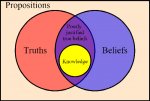Actually, my revised definition does not fall victim to the "no false lemmas" situations.
Of course, people can be tricked into holding what they perceive as a "justified true belief" if they are making their justifications based on
incorrect propositions, as is the case in both of the "no false lemmas" examples. The stated condition (iv) "
S's
belief that
p is not inferred from any falsehood" is a strawman representation of my amended definition: "justified true belief that does not depend on incorrect propositions," (or rephrased: "
S's
knowledge that
p is not inferred from any falsehood"). In both "no false lemmas" examples,
S is using an unjustified, potentially-untrue
belief to conclude
p, and therefore, equating my statement to (iv) is a strawman fallacy.
Unfortunately, the "no false lemmas" scenarios fail to demonstrate any inconsistency in my definition. However, my adjustment to the definition of "knowledge" would lead to an infinite regression, similar to the biblical inerrancy claims that I mentioned earlier. So perhaps objective truth is not a component of "knowledge" and we should change our definition to "justified belief" or "perceived justified true belief" and admit that what we perceive as "truth" may in fact be untrue.
How do you define knowledge? Is there a way to acquire knowledge (however you define it) of God through epistemic deductive reasoning?
The short of it is that whatever knowledge is, it isn't Justified True Belief or Justified True Belief with No False Premises.
Odd how you make assertions based your personal understanding of knowledge, while simultaneously neglecting to provide your own definition of "knowledge" (despite my inquiry:
What definition do you use for knowledge? What is the framework of your epistemic reasoning, and how does it provide knowledge of Christianity?).
It seems you've just discovered there is a problem with your definition of knowledge, so I'm not sure where you go from here.
Simple. When presented with a reason to consider my definition was inadequate or wrong, I
asked the person asserting that my definition was flawed something like: "
What definition do you use for knowledge? What is the framework of your epistemic reasoning, and how does it provide knowledge of Christianity?" but apparently those answers are not readily available.
But it seems that it might not do you any good to challenge people to give a justified true belief for a claim to knowledge, as you previously did on this thread, given that such a definition for knowledge is not correct.
Actually, many modern logicians, theologians, philosophers, etc. still assert that "justified true belief" is a perfectly acceptable way to define and discuss "knowledge." Also, I haven't
challenged anyone really, just asked how they have knowledge of God, and so far many of the responses have been enlightening. I've also learned that inquiry into epistemology is conduct unbecoming of a Christian. "Toe the line and don't ask questions. I won't answer them anyway." Yessir!
such a definition for knowledge is not correct.
Please demonstrate this by providing the correct definition of knowledge for me. Maybe it is "Perceived Justified true belief?" or "belief justified as true" or simply "Justified belief?" or something else entirely. I stated my definitions for the sake of clarity in communication, not as absolutely correct assertions.
If you have more accurate definition then please share it with me to aid in my understanding.
